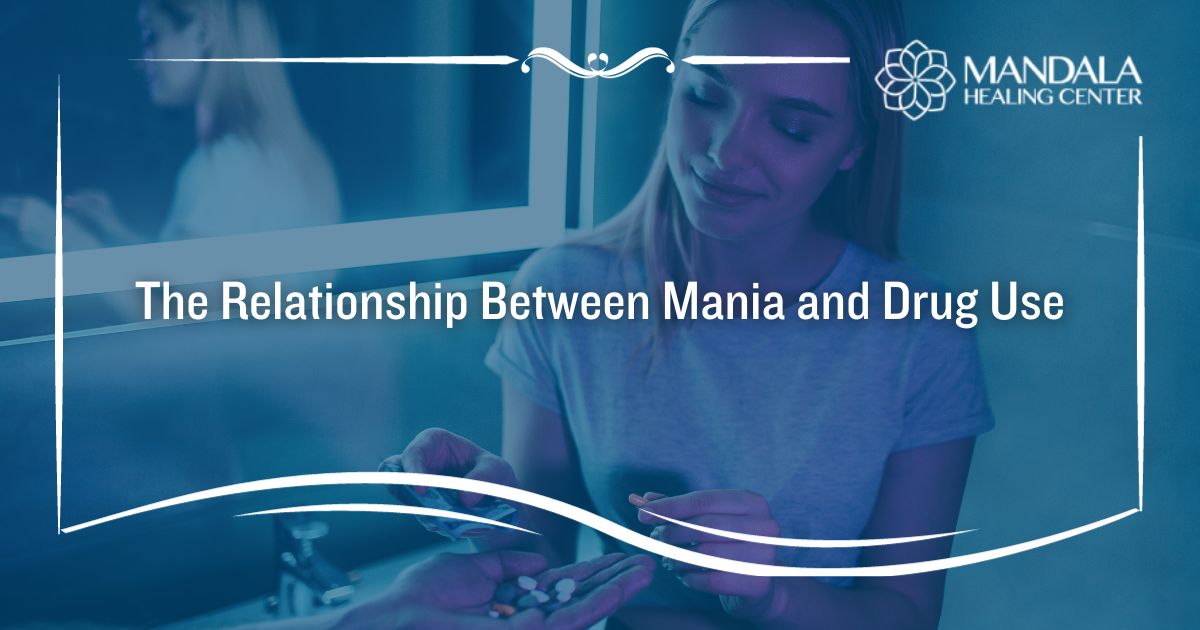Bipolar disorder is a mental health condition that causes people to experience periods of emotional highs (mania) and lows (depression). People with bipolar disorder deal with manic and depressive episodes, requiring medication to remain in a stable mood. When someone is unmedicated, they may deal with severe manic and depressive episodes that make it difficult to cope with everyday life.
According to the National Institutes of Mental Health (NIMH), about 4.4% of U.S. adults struggle with bipolar disorder.[1]
If you experience a manic episode, you might deal with increased energy, an exaggerated sense of well-being, unusual talkativeness, and impulsive behavior. Some people who struggle with severe mania deal with the symptoms of psychosis as well. Because of the symptoms mania can cause, many people turn to drugs or alcohol to cope.
What is Mania?
Mania is a condition that is most often experienced by people with bipolar disorder or schizoaffective disorder.
When someone deals with a manic episode, everything in their brain is sped up. This can look like increased talkativeness, making tons of plans for the future, insomnia, and impulsive behaviors like spending money you do not have or engaging in risky sex or drug use. Additionally, people with mania might experience psychotic symptoms like delusions, paranoia, or hallucinations.
Typically, mania lasts for at least seven days and up to a couple of months when you are not receiving proper treatment. Medications like mood stabilizers and antipsychotics can prevent you from experiencing manic episodes, as they balance the chemicals in your brain to keep your mood stable and even.
How is Substance Abuse Connected to Manic Episodes?
First, it is important to understand that bipolar disorder is strongly connected to substance abuse and addiction. Among patients with bipolar I disorder, 61% had a lifetime prevalence of any drug or alcohol use disorder.[2]
With that being said, substance abuse is most likely to occur during manic episodes. This can be for two reasons, including self-medicating the symptoms of mania or due to an increase in impulsive and risky behaviors.
Self Medication
When someone is dealing with mania that is unmedicated, their symptoms will be extremely difficult to cope with. From insomnia and extreme irritability to extreme changes in mood and symptoms of psychosis, mania can cause people to feel like their life is out of their control. As a result, many people struggling with mania may begin to use drugs and alcohol to numb their symptoms.
Over time, self-medication will lead to addiction. Unfortunately, drugs and alcohol will only worsen the symptoms of mania, so anyone suffering from mania and addiction must receive treatment from a dual-diagnosis treatment center.
Increased Impulsive Behaviors
Another way that mania is connected to substance abuse is due to an increase in impulsive behaviors. When someone is manic, they have a hard time thinking about the consequences of their actions. Instead, they act on impulse and do whatever they think is a good idea at the moment.
As a result, if someone experiencing mania begins to abuse drugs or alcohol, they might continue to do so at an alarming rate. This could lead to the development of addiction and worsen their impulsive behaviors at the same time.
How are Bipolar Disorder and Addiction Treated?
If you are struggling with mania that stems from bipolar disorder as well as addiction, you will need to receive support from a dual-diagnosis treatment center. These programs use a combination of mental health and addiction treatment services to ensure that their clients recover from both bipolar disorder and addiction at the same time.
The first step in dual diagnosis treatment is always medical detox. When you are addicted to a drug, your brain and body rely on it to function properly. As a result, suddenly stopping the use of that substance will cause you to experience withdrawal symptoms.
Thankfully, dual-diagnosis rehab programs will prescribe you medications to lessen your withdrawal symptoms until you are no longer experiencing them. After you overcome the detox stage of recovery, you will begin working on recovering behaviorally and psychologically.
Other services provided during dual diagnosis rehab programs for mania and addiction include:
- Evidence-based behavioral therapies for both addiction and bipolar disorder
- Group counseling
- Medication management
- Relapse prevention planning
- Aftercare services like referrals to sober living housing programs and access to alumni support groups
The goal of dual diagnosis treatment is to give you the tools and support you need to successfully manage your symptoms and learn to use healthy coping mechanisms instead of abusing substances.
Find Dual Diagnosis Treatment Today
If you or a loved one struggles with the symptoms of mania and drug abuse, it’s time to consider professional help. Dual-diagnosis treatment programs like Mandala Healing Center use a combination of clinically proven services for bipolar disorder and evidence-based addiction treatments. Our patients are empowered to reclaim their lives and restore their health, free from addiction and substance misuse.
To learn more about our dual diagnosis treatment programs, p contact us today.
References:
- The National Institutes of Mental Health (NIMH): Bipolar Disorder, Retrieved November 2023 From https://www.nimh.nih.gov/health/statistics/bipolar-disorder
- National Library of Medicine: The prevalence and significance of substance use disorders in bipolar type I and II disorder, Retrieved November 2023 from https://www.ncbi.nlm.nih.gov/pmc/articles/PMC2094705/












